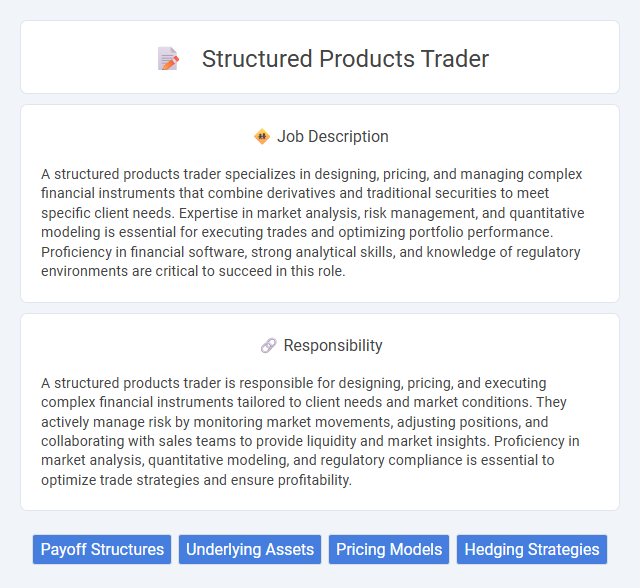
A structured products trader specializes in designing, pricing, and managing complex financial instruments that combine derivatives and traditional securities to meet specific client needs. Expertise in market analysis, risk management, and quantitative modeling is essential for executing trades and optimizing portfolio performance. Proficiency in financial software, strong analytical skills, and knowledge of regulatory environments are critical to succeed in this role.
Individuals with strong analytical skills and a high tolerance for risk are likely to thrive as structured products traders. Those comfortable with fast-paced decision-making and complex financial models may find this role suitable, while people who struggle with pressure or prefer predictable routines might face challenges. The job probably suits proactive, detail-oriented professionals who adapt well to market fluctuations.
Qualification
A Structured Products Trader requires strong expertise in financial derivatives, quantitative analysis, and risk management to design and trade complex investment solutions. Proficiency in programming languages such as Python, MATLAB, or R enhances the ability to model pricing, hedging strategies, and market scenarios effectively. Advanced degrees in finance, mathematics, or engineering combined with certifications like CFA or FRM significantly improve analytical skills and credibility in this specialized trading role.
Responsibility
A structured products trader is responsible for designing, pricing, and executing complex financial instruments tailored to client needs and market conditions. They actively manage risk by monitoring market movements, adjusting positions, and collaborating with sales teams to provide liquidity and market insights. Proficiency in market analysis, quantitative modeling, and regulatory compliance is essential to optimize trade strategies and ensure profitability.
Benefit
A career as a structured products trader likely offers substantial financial rewards through bonuses and commissions tied to performance. Exposure to complex financial instruments may enhance analytical skills, increasing marketability in the finance industry. The role could provide valuable experience in risk management and client interaction, fostering professional growth and networking opportunities.
Challenge
A structured products trader likely faces the challenge of balancing complex financial instruments' risk and reward in volatile markets. Navigating regulatory changes while optimizing product design for client needs demands continuous adaptation and deep market insight. The role probably requires strong analytical skills to manage pricing models and anticipate market shifts effectively.
Career Advancement
A structured products trader specializes in designing and managing complex financial instruments that combine derivatives, bonds, and equities to meet specific investment objectives. Expertise in market analysis, risk management, and financial modeling drives career advancement opportunities toward senior trading roles, portfolio management, or strategic leadership within investment banks and asset management firms. Mastery of regulatory compliance and client relationship management further enhances prospects for promotion and broader industry influence.
Key Terms
Payoff Structures
Structured products traders specialize in creating and managing complex financial instruments tailored to specific payoff structures such as barrier options, autocallables, and credit-linked notes. Mastery of modeling and hedging these payoff profiles enables traders to optimize risk-adjusted returns and meet diverse investor objectives. Proficiency in quantitative techniques and market analytics is essential for analyzing payoff behaviors under various market scenarios.
Underlying Assets
A Structured Products Trader specializes in creating and managing complex financial instruments linked to various underlying assets such as equities, bonds, commodities, or indices. Expertise in analyzing market movements, volatility, and correlation among these underlying assets is crucial for pricing, hedging, and risk management strategies. Mastery over derivative instruments and quantitative models enhances the trader's ability to optimize product performance based on the behavior and dynamics of underlying assets.
Pricing Models
Structured products traders utilize advanced pricing models such as Black-Scholes, Monte Carlo simulations, and binomial trees to evaluate complex derivatives and tailor investment solutions. They continuously refine model parameters to reflect market dynamics, volatility, and interest rate shifts, ensuring accurate valuation and risk management. Expertise in quantitative finance and programming enhances their ability to optimize pricing strategies and maximize profitability.
Hedging Strategies
A Structured Products Trader specializes in designing and managing complex financial instruments that combine derivatives and underlying assets to achieve specific risk-return profiles. Hedging strategies in this role involve utilizing options, futures, swaps, and delta-neutral techniques to mitigate market, credit, and interest rate risks associated with structured products. Effective hedging requires continuous monitoring of portfolio exposures and dynamic adjustment to align with market volatility and regulatory requirements.
 kuljobs.com
kuljobs.com